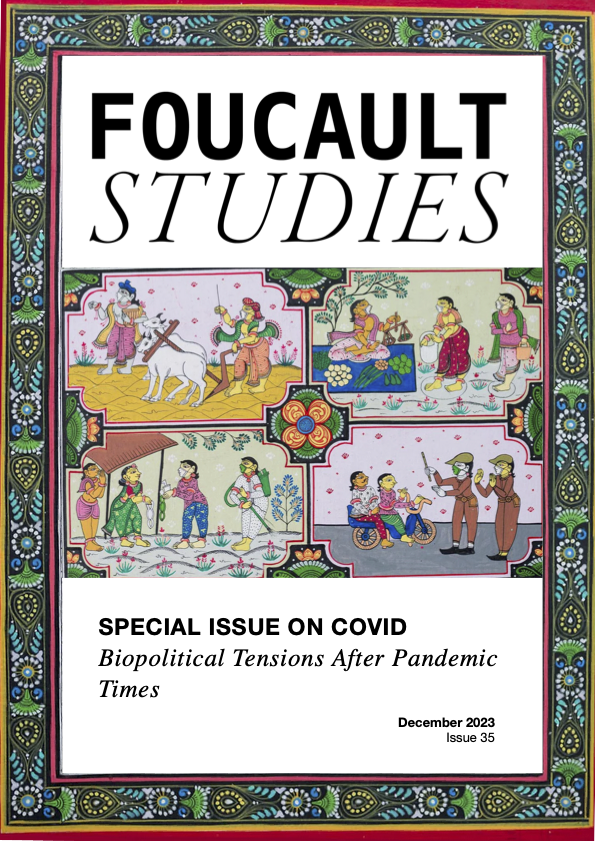Virus as a figure of geontopower or how to practice Foucault now?
A conversation with Elizabeth A. Povinelli
DOI :
https://doi.org/10.22439/fs.i35.7081Résumé
Elizabeth A. Povinelli, Franz Boas Professor at Columbia University, is a philosopher and anthropologist who has critically engaged with Michel Foucault’s ideas as well as scholarship inspired by his works. Povinelli has been dedicated to research on colonialism within liberalism and is also a filmmaker and founding member of The Karrabing Film Collective. The film collective is part of a larger organization of Aboriginal peoples and artists living in the Australian Northern Territory that refuses ‘fantasies of sovereignty and property’.[1]
As Povinelli shares with us during the interview, her trajectory was constituted in the middle of the 1980s following her life-changing encounter with the elders in Belyuen in the Australian Northern Territory. In the wake of that encounter, and with urgent issues raised about indigeneity due to changes in Australian law, Povinelli has been working even closer with her Karrabing family. The changes in law both acknowledged Aboriginal peoples' rights to their territory and imposed certain ideas of identity, family and culture, producing an entanglement between rights and government. These efforts to manage differences – cultural, race, gender – are problematized and deciphered in Povinelli’s ethnographic work with a focus on how late settler liberalism has been reconfigured with novel expressions of colonialism and imperialism. Now embedded...
Références
Ahmann, Chloe, “’It’s exhausting to create an event out of nothing’: Slow Violence and the Manipulation of Time,” Cultural Anthropology 33:1 (2018), 142-171. https://doi.org/10.14506/ca33.1.06
Chakarabarty, Dipesh, “The Climate of History: Four Theses,” Critical Enquiry 35:2 (2009), 197-222. https://doi.org/10.1086/596640
Couthard, Glen, Red Skin, White Masks: Rejecting the Colonial Politics of Recognition. Minneap-olis and London: University of Minnesota Press, 2014.
Foucault, Michel, History of Sexuality 1: An Introduction [1976]. New York: Pantheon Books, 1978.
Foucault, Michel, Abnormal: Lectures at the College de France 1974-1975 [1999]. London and New York: Verso, 2003.
Foucault, Michel, The Government of Self and Others: Lectures at the College de France 1982-1983 [2008]. New York: Palgrave Macmillan, 2010.
Grove, Kevin J., “Security Beyond Resilience,” Environment and Planning D: Society & Space 35:1 (2017), 184-194. https://doi.org/10.1177/0263775816686583
Haraway, Donna, Staying with the Trouble: Making Kin in the Chthulucene. Durham, US: Duke University Press, 2016. https://doi.org/10.1215/9780822373780
Haraway, Donna, “Anthropocene, Capitalocene, Chthulucene: Making Kin,” Environmental Humanities 6:1 (2015): 159-165. https://doi.org/10.1215/22011919-3615934
Irigaray, L., Speculum of the Other Woman [1974]. New York: Cornell University Press, 1985.
Mbembe, Achille, “Necropolitics,” Public Culture 15:1 (2003), 11–40. https://doi.org/10.1215/08992363-15-1-11
Nixon, Rob, Slow Violence and the Environmentalism of the Poor: Cambridge, MA: Harvard University Press (2011). https://doi.org/10.4159/harvard.9780674061194
Povinelli, Elizabeth, The Inheritance. Durham: Duke University Press (2021). https://doi.org/10.1515/9781478021346
Povinelli, Elizabeth, “The Virus: Figure and Infrastructure,” E-flux (2020) https://www.e-flux.com/architecture/sick-architecture/352870/the-virus-figure-and-infrastructure/
Povinelli, Elizabeth, Geontologies: a Requiem for Late Liberalism. Durham: Duke University Press (2016). https://doi.org/10.2307/j.ctv11g9857
Povinelli, Elizabeth, “The Will to Be Otherwise/ The Effort of Endurance,” The South Atlan-tic Quarterly 111:3 (2012), 453-475. https://doi.org/10.1215/00382876-1596236
Povinelli, Elizabeth, “Routes/World,” E-flux 27 (2011) https://www.e-flux.com/journal/27/67991/routes-worlds/
Povinelli, Elizabeth, Economies of Abandonment: Social Belonging and Endurance in Late Liberal-ism. Durham: Duke University Press (2011b). https://doi.org/10.2307/j.ctv11smk4t
Povinelli, Elizabeth, The Cunning of Recognition: Indigenous Alterities and the Making of Australian Multiculturalism. Durham: Duke University Press, 2002. https://doi.org/10.2307/j.ctv116895z
Povinelli, Elizabeth, “Sexual Savages/Sexual Sovereignty: Australian Co-lonial Texts and the Postcolonial Politics of Nationalism,” Diacritics 24:2-3 (1994), 122-150. https://doi.org/10.2307/465168
Povinelli, Elizabeth, Labor’s lot: The Power, History, and Culture of Aboriginal Action. Chicago: University of Chicago Press, 1994.
Povinelli, Elizabeth, “Relations, Obligations, Divergences,” World Records Journal, 7:4 (n/d). https://worldrecordsjournal.org/relations-obligation-divergences/
Todd, Zoe, “Fish, Kin and Hope: Tending to Water Violations in amiskwaciwâskahikan and Treaty Six Territory,” Afterall: A Journal of Art, Context and Enquiry 43, (2017), 102-107. https://doi.org/10.1086/692559
Téléchargements
Publié-e
Comment citer
Numéro
Rubrique
Licence
© The Authors 2023

Cette œuvre est sous licence Creative Commons Attribution - Pas d'Utilisation Commerciale - Pas de Modification 4.0 International.
Authors retain copyright to their work, but assign the right of the first publication to Foucault Studies. The work is subject to a CC BY-NC-ND 4.0 license, but despite these restrictions, authors can take for granted that Foucault Studies will permit articles published in Foucault Studies to be translated or reprinted in another format such as a book providing a full reference is made to Foucault Studies as the original place of publication.



